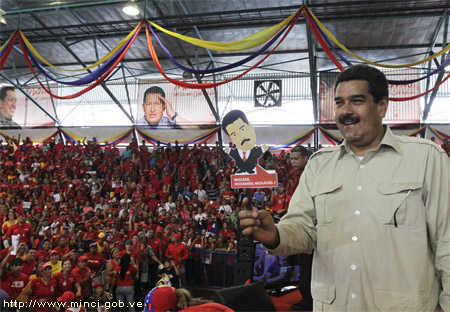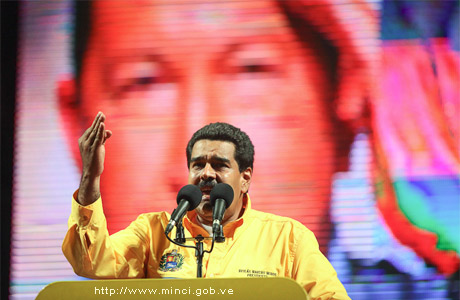Venezuela: Maduro Taking Lead

As polls say, opposition candidate Henrique Capriles has no chances. This very fact poses threat to stability. Acting President Nicolas Maduro, the candidate of left-wing forces led by United Socialist Party of Venezuela (El Partido Socialista Unido de Venezuela) is gradually breaking away. According to various polls, the advantage is 18-20% in his favour. Even General John Kelly, commander of US Southern Combatant Command, says Venezuela will steer the same course after the election is over…
Capriles needs dramatic exacerbation of the situation to turn the tide… Opposition students did just that trying to break through to the National Electoral Council (Spanish: Consejo Nacional Electoral - CNE) accusing Tibisai Lucena, the Committee’s head, of being in complicity with the Bolivarian regime.
The rumors are spread there will be lack of food and hunger is imminent. Electricity and water supply is systematically interrupted because of accidents and, sometimes, subversive actions. Opposition media, predominant in the country’s information space, overblows each and every thing that could damage the government’s image, at least in theory. It brings into focus the criminal situation, saying that, allegedly, Venezuela is the Latin American leader in violent death. It juggles with facts not even taking the pain to have a look at statistics saying Mexico, Guatemala and Honduras top the Latin American crime list - the very same countries where the United States is directly involved in the process of «strengthening democracy».
In an interview to a state TV channel, Maduro said the US-based enemies of Bolivarian government plan to disrupt voting by making the country plunge into chaos by assassinating Enrique Capriles. According to Maduro, the information is fully reliable; it had been reported by military intelligence. He pointed the finger at Otto Reich and Roger Noriega, the US right-wing politicians, who are behind the plot. The both have held the position of Assistant Secretary of State for Western Hemisphere Affairs. The both are close to the CIA and respected by the Pentagon, they had defended the interests of these agencies in Latin America. Maduro called on President Obama to put a stop to the ominous plans. According to Maduro, «Roger Noriega, Otto Reich, functionaries of the Pentagon and the CIA are behind a plan to assassinate the presidential candidate of the Venezuelan right (Capriles Radonski), to create chaos in Venezuela – we have information from very good sources – to blame the government of Venezuela, to create chaos in Venezuela, to fill Venezuelans with hate».
The political scholars have no doubts about the authenticity of information. The radical opposition needs a «martyr». They need a victim to fight the supporters of Chavez. The scenario has been tried before by the CIA and the Pentagon in many counties. In Venezuela the Bolivarian government would be blamed for killing Capriles. A wave of violence would hit the country. Destabilization is what they aim at. The opposition would gain more time for consolidation, the election would be put off for the time it finds more propitious, and there would be an opportunity to look for a more promising figure as a presidential hopeful. It should be noted; Maduro and his supporters have done the right assessment of the situation and reinforced the personal guard of Capriles. According to Maduro, he had more interest than anybody else that the opposition candidate would be safe and have each and every opportunity to enjoy his political rights and freedom to freely move around the country during the campaign.
It should be noted that Capriles, who lost the October 2012 election to Chavez, was not eager to run for presidency again. It was a hard win against Elias Jaua, the incumbent Foreign Minister, during the Miranda state election afterwards. But the US and Israeli sponsors, as well as the leadership of the opposition organization called MUD (the Democratic Unity Roundtable) insisted Capriles would get into the fray to fight Maduro. He was promised millions of dollars and broad-scale support of Venezuelan and world media.
The US consultants did their best to boost the image of the 40 year old, unmarried candidate. They tried to make him look like a macho man and went to any length to make him ready for a tough fight against the Bolivarian candidate. The first speeches of Capriles made obvious what kind of instructions he had received. He was ironic talking about Maduro, dropping hints he owed his career fully to the fact he was close to Chavez. According to him, there were more merited presidential candidates in the Bolivarian ranks. Capriles says Maduro has no independent ideas, that’s why he cites Chavez all the time, a thousand times a day. According to him, he wears the clothes made in Venezuela while Maduro prefers it to be foreign-made. Capriles says that being abroad Maduro knows his way around better than when he is in Venezuela. Maduro has called Capriles the «decadent prince of the parasitic bourgeoisie». He said nine out of ten words said by Capriles was repetition of his name Nicolas. Capriles seems to be crazy about it. Talking about Venezuela, Maduro and Comandante Chavez have gone to every corner of it. Thanks to Chavez the acting President has gotten acquainted with China, Argentina and other countries.
The years of political education during the Chavez tenure make it easier for voters to make out who is who. El Sol de Margarita, a provincial newspaper, published an article called A Chavista President on March 22, 2013. It says, «Maduro has been successful occupying all the positions the revolution assigned him to. For instance, it was the most effective and coherent foreign policy in the Venezuelan history when he served as the Minister of Foreign Affairs. To the contrary, being the alcalde of Baruta or the governor of Miranda, Capriles converted them into the most criminal areas of the country. Nicolas is a candidate of peace and homeland, while Capriles defends the interests of stateless oligarchs and foreign groups, most prone to violence. Maduro stands on the side of national majority, miserable common people…Capriles sides with the most potent and rich minority, which exploits the working people, homeland means nothing for these people; they care only about their individual or group interests. Maduro is a guarantor of civil peace, while there is no doubt Capriles is associated with violence and utmost manifestation of contemporary fascism. Maduro expresses national sentiments, real faithfulness to Venezuela, the country he feels attachment for being a creole, while Capriles expresses the interests of Yankee and other foreign circles, he doesn’t know the country, has no feeling for homeland, he represents frenzied oligarchs».

Both, Maduro and Capriles, adopt the very same manner of active communication Hugo Chavez used so efficiently. The Bolivarian candidate comes to meetings driving a bus challenging those who speak disparagingly about his proletarian past. Maduro transformed in his own way the slogan of Capriles during his first election campaign, he says that now the bus of progress has an experienced driver. Capriles used to say that the bus of progress has a seat for all Venezuelans. "Those who want progress, jobs, well-managed companies, somewhere we can develop small and medium businesses…everyone who wants that kind of country, come and join my bus for progress," Mr. Capriles said back then. Maduro starts his meeting with singing national anthem confidently conducting many thousands of people who came to listen to him. Facing the crowds, he is free and relaxed, he takes small children into his hands, and he dances like Chavez and is blunt talking about the United States and its Venezuelan yes-men. That’s what many Venezuelans want him to be like. He cannot frustrate them. While speaking he slightly imitates Chavez, deviating from the main issue, improvising outwardly, telling tales and funny stories and then smoothly getting back to where he was. To large extent Capriles tries to imitate Chavez too. He even appears in front of people wearing a red shirt, like the Chavistas do. He was predominantly surrounded by people of European appearance, now one can see dark-skinned Venezuelans around him. Pro-government media noticed the tendency to adopt Chavez-style behavior; he was advised to put a birthmark on forehead to look more like the leader of the revolution.
The election campaign continues. The remaining two weeks promise to be extremely tense and full of conflict. Nicolas Maduro doesn’t exclude that Capriles may refuse to go on under a plausible pretext – unequal conditions, the use of administrative power to influence the events by Charistas etc. Such step would result in 10 million votes for the Bolivarian candidate.